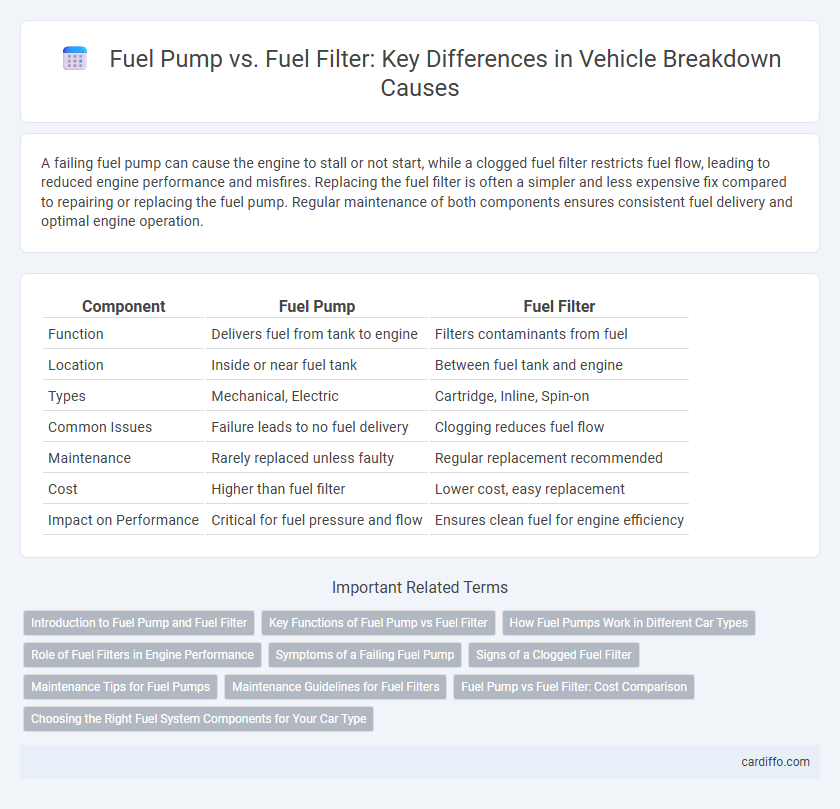A failing fuel pump can cause the engine to stall or not start, while a clogged fuel filter restricts fuel flow, leading to reduced engine performance and misfires. Replacing the fuel filter is often a simpler and less expensive fix compared to repairing or replacing the fuel pump. Regular maintenance of both components ensures consistent fuel delivery and optimal engine operation.
Table of Comparison
| Component | Fuel Pump | Fuel Filter |
|---|---|---|
| Function | Delivers fuel from tank to engine | Filters contaminants from fuel |
| Location | Inside or near fuel tank | Between fuel tank and engine |
| Types | Mechanical, Electric | Cartridge, Inline, Spin-on |
| Common Issues | Failure leads to no fuel delivery | Clogging reduces fuel flow |
| Maintenance | Rarely replaced unless faulty | Regular replacement recommended |
| Cost | Higher than fuel filter | Lower cost, easy replacement |
| Impact on Performance | Critical for fuel pressure and flow | Ensures clean fuel for engine efficiency |
Introduction to Fuel Pump and Fuel Filter
The fuel pump is a critical component responsible for delivering fuel from the tank to the engine at the required pressure, ensuring optimal engine performance. The fuel filter plays a vital role in protecting the fuel system by trapping contaminants and debris before they reach the fuel injectors, preventing clogging and damage. Both parts are essential for maintaining efficient fuel flow and engine reliability.
Key Functions of Fuel Pump vs Fuel Filter
The fuel pump is responsible for delivering fuel from the tank to the engine at the required pressure to ensure efficient combustion, while the fuel filter's key function is to remove contaminants and debris from the fuel before it reaches the engine components. A properly functioning fuel pump maintains consistent fuel flow, preventing engine stalling and performance issues. Simultaneously, a clean fuel filter protects the fuel injectors and engine from damage caused by impurities, enhancing overall vehicle reliability and fuel efficiency.
How Fuel Pumps Work in Different Car Types
Fuel pumps deliver fuel from the tank to the engine, with variations between car types such as mechanical pumps in older carbureted engines and electric pumps in modern fuel-injected systems. Electric fuel pumps maintain consistent pressure for optimal engine performance, especially in vehicles with high fuel demand like performance cars or trucks. Understanding these pump types helps diagnose breakdowns related to fuel delivery issues across diverse automotive models.
Role of Fuel Filters in Engine Performance
Fuel filters play a critical role in maintaining engine performance by preventing contaminants such as dirt, rust, and debris from entering the fuel system and causing damage to the fuel pump and injectors. A clean fuel filter ensures proper fuel flow and pressure, which is essential for efficient combustion and optimal engine power. Neglecting fuel filter maintenance can lead to reduced fuel efficiency, engine misfires, and increased wear on the fuel pump.
Symptoms of a Failing Fuel Pump
Symptoms of a failing fuel pump include engine sputtering at high speeds, difficulty starting the vehicle, and sudden power loss during acceleration. A failing pump may cause inconsistent fuel pressure, leading to engine misfires and stalling. Unlike a clogged fuel filter, which restricts fuel flow gradually, a faulty fuel pump often results in complete fuel delivery failure, impacting overall engine performance.
Signs of a Clogged Fuel Filter
Signs of a clogged fuel filter include engine misfires, a noticeable drop in fuel efficiency, and difficulty starting the vehicle, which can often mimic symptoms of a failing fuel pump. A clogged fuel filter restricts fuel flow, causing the engine to struggle under load or hesitate during acceleration, whereas a failing fuel pump typically produces noise or complete engine shutdown. Regular maintenance and replacement of the fuel filter are crucial to preventing fuel system breakdowns and ensuring consistent engine performance.
Maintenance Tips for Fuel Pumps
Regular maintenance of fuel pumps includes inspecting and replacing fuel filters every 20,000 to 30,000 miles to prevent clogging and ensure proper fuel flow. Using high-quality fuel and keeping the fuel tank at least quarter full reduces strain on the pump and extends its lifespan. Periodic pressure testing and cleaning of the fuel pump assembly help detect early signs of wear or malfunction, minimizing the risk of breakdowns.
Maintenance Guidelines for Fuel Filters
Regular maintenance of fuel filters is crucial to prevent fuel system breakdowns and ensure optimal engine performance. Fuel filters should be inspected and replaced every 20,000 to 40,000 miles, depending on vehicle manufacturer recommendations and fuel quality. Neglecting fuel filter maintenance can lead to clogged filters, reduced fuel flow, and increased strain on the fuel pump, ultimately causing costly repairs.
Fuel Pump vs Fuel Filter: Cost Comparison
Fuel pump replacement typically costs between $400 and $600 due to the complexity of the part and labor involved, while fuel filter replacement ranges from $50 to $150, making it a more affordable maintenance option. The higher price of fuel pumps reflects their critical role in delivering fuel under pressure, whereas fuel filters primarily protect the engine from debris and contaminants. Regular fuel filter changes can prevent premature fuel pump failure, potentially reducing overall repair expenses.
Choosing the Right Fuel System Components for Your Car Type
Selecting the right fuel system components hinges on your car's make, model, and engine specifications, ensuring optimal performance and longevity. A high-quality fuel pump must match the vehicle's fuel delivery requirements, while a compatible fuel filter protects the engine by preventing contaminants from entering the fuel injectors. Prioritizing components engineered for your specific car type reduces breakdown risks and enhances fuel efficiency.
Fuel pump vs fuel filter Infographic

 cardiffo.com
cardiffo.com